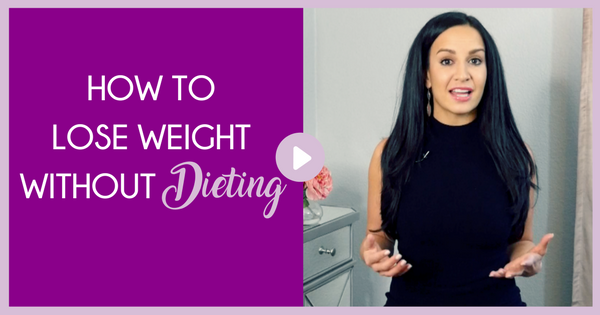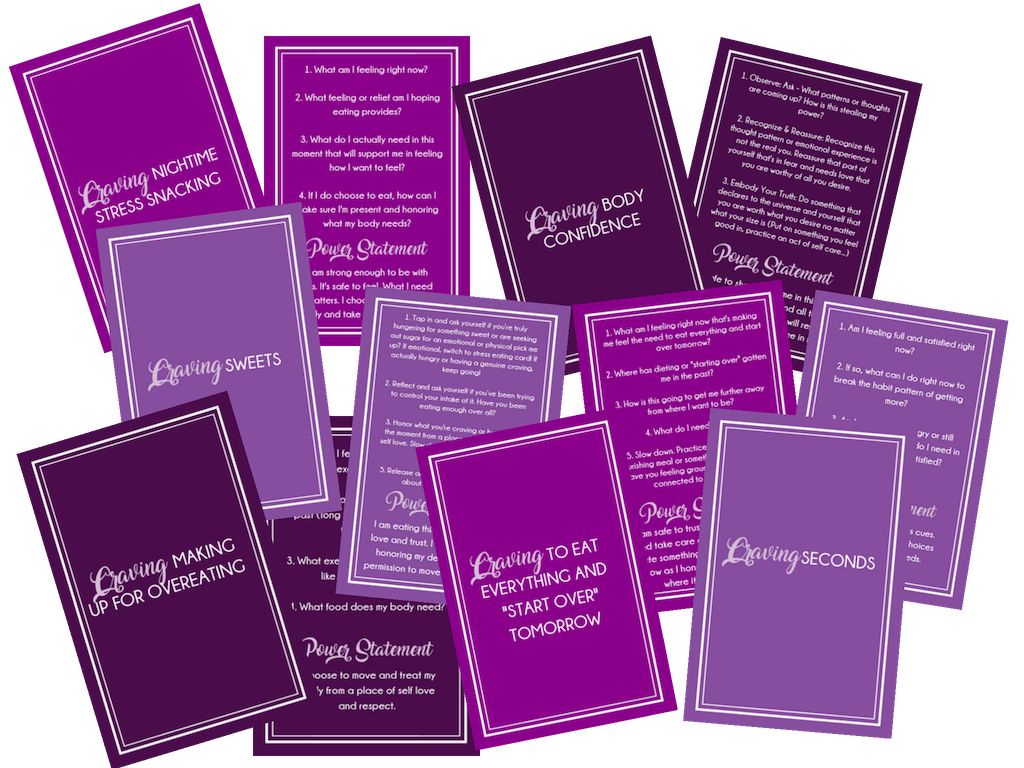5 Reasons Why Intermittent Fasting Is NOT The Answer To Stopping Binge Eating And Weight Loss
“What do you think about intermittent fasting?”
I get asked about it a LOT, especially by people who struggle with binge and emotional eating.
“Is it the long-awaited miracle cure the gurus and influencers claim it to be?”
“Isn’t it the solution to being able to eat big meals and still lose weight?
My short answer? Not if you want the weight loss to be easy and last.
Read on and watch the video below where I share not only my take on intermittent fasting but also the real scoop on what it’s all about.
You’ll get the objective facts along with my honest opinions and experiences. When we’re done, you’ll have the tools you need to decide if fasting is worth a go for you–or not.
So let’s jump into the world of intermittent fasting right now!
Now, before we start, here’s a quick disclaimer.
I’ve tried intermittent fasting. I’ve had many clients who have tried it too. I’ve seen a lot of its real-world effects. I’ve also done a lot of research and have seen all the science behind it.
Needless to say, I’ve got a loaded opinion about fasting. It’s backed by all the things– science, research, personal experience, and coaching experience. So I wanted to be clear on where I’m coming from before we start.
If you’re not familiar with intermittent fasting, it’s basically this:
You set a designated eating window every day, typically 8 hours or so. You’ve got a set number of hours to get your eating in, and when your time is up, you’re done eating.
For example, an average intermittent faster might only eat between the hours of noon and 8PM. That means that before noon and after 8PM, no eating is allowed.
Some fasters take it to even greater extremes and shorten that 8-hour time frame. For example, I’ve seen some people limit their eating to one meal a day, sometimes waiting as late as 3PM to have it. Then it’s back to fasting until 3PM tomorrow.
Sounds pretty extreme, right? But for a lot of binge eaters, the idea of intermittent fasting actually has a lot of appeal…
Think about it for a moment. You get to stack all your calories into a short window. You get that overly full, satiated feeling that many binge eaters really like. Plus, the experts also claim that fasting will also help you get more mental clarity and energy, and of course lose weight.
When you put it that way, it almost sounds like the ideal solution, doesn’t it?
When I first heard about intermittent fasting, it sounded like a dream. I could eat all my calories in two sittings, get these huge meals, and feel satisfied. Plus, the experts said I’d lose weight and get rid of the binging brain fog, too. What could possibly go wrong?
So, I get why the idea of intermittent fasting appealing in theory. Not only does it make some exciting sounding claims, but it also has a lot of compelling science behind it.
But as with many things that seem too good to be true, intermittent fasting let me down. I learned really fast that in the real world, it didn’t improve my struggle with binging.
In fact, it made my struggle WAY worse.
Here are 5 things that I’ve learned about Intermittent Fasting:
1- Running on empty taxes your body. Many of us live high-stress lives. One of the most important ways to manage stress is by properly fueling your body. Even if your life isn’t super-stressful, your body still needs support to get through the day.
But when you deny yourself food because it is “fasting hours,” you only trigger more stress. And more potential long-term problems.
During a fast, your body pulls from its reserve fuel supplies. Now, that might sound exciting, especially if you subscribe to the idea that your body uses fat during the fasting times.
Unfortunately, this age-old idea is pretty much a myth! Sure, your body does burn some fat when you fast. But it mostly stresses out your adrenals and taxes your hormonal systems.
Fasting can be seriously taxing on your body whether you’re a man or a woman. But with women, pushing your body to the fasting extremes can be extra hard on your hormones, your adrenals, and your thyroid.
So you might get a hit of mental clarity from a morning fast. But long-term, it wreaks havoc on your body’s systems and puts you in a perpetual stress mode. For a life that’s probably stressful to start with, it’s stress on top of stress.
2- It actually slows weight loss (in many cases). Most of us look at fasting as a way to lose weight. But the irony is that over time, fasting actually can actually halt your weight loss efforts.
Here’s the deal. The longer you fast, the more your body misses out on the nutritional support it needs. When your body doesn’t get what it needs, it triggers what is essentially a fight-or-flight response.
It’s what we at Beating Binge Eating call “survival mode” (more on that in a moment). And survival mode has a ton of nasty side effects.
Survival mode lowers your metabolism. It slows down your digestion. Your body has a harder time assimilating the nutrients from your food. All these things set off more cravings and food-focused thoughts. This leads to more binging, and eventually more weight gain.
So the longer you practice fasting in hopes of losing weight, the more likely you’ll get the exact opposite result.
3- It triggers binge-like behavior. One of the key steps in freeing yourself from binging is to fuel yourself throughout the day. But if you spend several hours fasting, clearly this isn’t going to happen.
Even worse is what happens when you DO allow yourself to eat. The food floodgates open, and the ravenous eating is ON. This is because those fasting hours put you into survival mode.
That’s the thing about survival mode. It doesn’t matter what your mindset is, your psychology, or how committed you are to your goals. When your brain perceives food scarcity, it drives you to seek out food. It makes you think about food, crave more food, and eat more food.
So those fasting hours can actually set you up for binging, no matter how well-intended they are.
4- It creates an on-track/off-track relationship with food. With traditional dieting, there’s this whole “on-track/off-track” idea about food. You’re either on the diet and doing it right, or you mess up, eat a cookie, and blow it. Then, of course, you figure you’ll “start over tomorrow” and finish that bag of cookies. (We’ve all been there and done that, right?)
But just like dieting, intermittent fasting creates an all-or-nothing attitude about food.
For example, many fasters go overboard with food during their eating hours. Then tell themselves that they’ll just “fast longer tomorrow.” This almost permits them to eat more in the moment, telling themselves they’ll get “back on track” later.
In the end, fasting almost becomes an excuse to go on and off-track with food. It also creates the same long-term mentality that dieting does–and the same results.
5- It doesn’t encourage present-moment choices. Another key step to beating binge eating is making present moment food decisions. That is, taking steps like asking yourself what you need to eat to feel nourished and supported. It’s knowing what your body needs moment to moment, and honoring it accordingly.
But, allowing the clock to decide whether you can eat or not will not support you long-term. It won’t encourage you to honor your body’s needs from moment to moment. It will just tell you when you can and can’t eat based on the hour of the day.
A balanced, easy relationship with food is the key to food freedom. But having to look at the clock before you give yourself permission to eat clearly won’t help you achieve that!
So, with these five key points, I bet you can guess my personal position on intermittent fasting. Honestly, I don’t recommend it to anyone, especially if you have any struggles with food.
Let me put it this way – If your relationship with food doesn’t feel easy, fasting is at best a band-aid solution. Sure, It might tame down some of the binge-like behaviors and triggers for a while. But in the long run, relying on fasting will backfire with more cravings, more binging, and more weight gain.
Even worse, it will further disconnect you from your body. It will push you out of the present moment, and keep you in an on-track/off-track relationship with food.
Pretty much sounds like dieting in the end, doesn’t it?
So here’s my last take on intermittent fasting. If you truly want to heal your relationship with food and end weight loss struggles for good, intermittent fasting is NOT the answer.
Now, let’s talk about what actually will help you achieve the things you desire!
Click the image below where I’ve got a special gift for you! We call them, “Craving Cards”, and they’re one of our most popular tools!
If you ever feel night time cravings, sugar cravings, the urge to just say “screw it I’m going to start my diet over tomorrow”, or like you need a little body confidence pick me up…
Just grab a card, go through the prompts, and shift it instantly!

Click the image above and let me know where to send them!
You’ll also get mini demo video training sessions for each card where I share how to use the cards and some of my best tips for food freedom forever!
With our Craving Cards and Demo Series…
You’ll learn how to stop cravings in their tracks, feel confident, and get back your power, fast!
Love,
Brittany
PS: Want the exact freedom and ease with our foods that myself and thousands of our clients get to experience?
In our Beating Binge Eating Blueprint (BBEB), I show you how to make this happen in just 8 weeks!
Many of our students have seen a DRASTIC difference in as little as a few days!
It’s our signature program, and up until recently, it was $3000 or more to join.
For now, you can get it as a part of our Food Freedom Collection for practically free by clicking the image below!
There is no catch…every resource I’ve created for food freedom and body confidence will land straight in your if you just click that image below and let me know where to send it!












Leave a Reply
You must be logged in to post a comment.